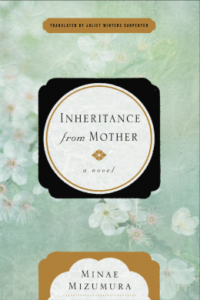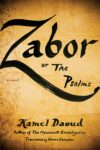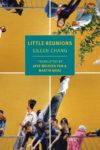 [Other Press; 2017]
[Other Press; 2017]
Tr. by Juliet Winters Carpenter
Minae Mizumura’s ambitious second novel, Inheritance from Mother, is a multigenerational family saga that soberly probes the dignified submissiveness of Japanese middle-aged daughters and wives. The plotting is brisk, with an aggressive forward momentum more characteristic of thrillers or pulpy fiction. The sixty-six chapters are economical, each detailing a single event or memory. But the fleet-footedness of her plotting matches the profundity of her investigation into family relationships. The novel is structured into two major arcs that follow a course of one year in the life of Mitsuki Katsura, a middle-aged French language instructor at a local university. The first traces the decline of her mother, the Katsura family matriarch, into dementia and death. In the second, Mitsuki attempts to reorganize her life following both her mother’s death and the discovery of her husband’s infidelity.
Mizumura rather manipulatively opens the novel with a moment of disenchantment and suspends that moment in time until some two hundred pages later, upon which Mitsuki travels to a lakeside resort following her mother’s death. The first arc begins at its end: Mizumura writes toward an ending that we have already internalized, then progresses backward in time toward the start of Mistuki’s mother’s crippling fall on the street, the start of her debilitation. Though anchored to the present through scenes of the mother’s progressive decline, the first arc unfolds as a slow, doleful march through Mitsuki’s childhood and young adulthood. For the most part, the past is not a respite, a land of rosiness and opportunity, but an extension of the futile and disenchanted present. The novel’s power, in large part due to this intelligent sequencing of events, lies in the sense that the first chapter’s point of jadedness becomes inevitable, a naturally unnatural response to a lifetime of thwarted dreams.
As in Camus’ The Stranger, Mitsuki’s mother is dead on arrival. In the opening chapter, Mitsuki and her sister unsentimentally deliberate over their refund from Golden, a senior home, due to their mother’s premature death. The daughters welcome the death as an act of mercy and deliverance, as an exoneration of their necessary servitude to the dying woman. Mitsuki pitilessly confesses to a sense of unburdening:
She felt no guilt about leaving their mother’s body unattended in the mortuary freezer while chatting on the phone about how to spend their inheritance. She even felt no guilt about not feeling guilty. And she had no intention of revisiting the funeral home till two days later, when the body would be put into its coffin.
Mitsuki sees her mother’s death as an opportunity rather than a tragedy. She deals strictly in terms of something gained rather than something lost. Her callousness bristles and shocks. Children are often exhorted to become their own individuals, and whether violently or otherwise, to sever themselves from their parents. But the severance Mitsuki seeks is uncharacteristically and remorselessly complete. It is one of the captive from the captor. She resembles the haunted praying for the exorcism of an embittered spirit.
Mitsuki’s captivity is primarily a product of her sense of duty and passivity. In the first arc of the novel, circumstances mercilessly conspire against her: her sister remains in poor health, her mother becomes increasingly demanding for luxury, and she discovers solid evidence of her husband’s adultery. Her response is typically one of stifled rage, never outwardly manifested, but only internalized for private self-laceration. In response to her mother’s crazed plea to Mitsuki to end her life, the daughter “felt less pity than irritation. She too wanted her mother to die — had long yearned for her death with an intensity far greater than her mother’s. At the same time she had done everything she possibly could to make her happy, perhaps shortening her own life a little in the process. And she would have to go right on doing exactly the same thing.” Mizumura, in one of her anthropological asides, observes that the Japanese have been cultured to accepting the unjust vagaries of life and that acceptance is often recognized as a form of quiet dignity. As a child, Mitsuki took pride in her devotion to family: “She told herself that she was better off helping her mother and being praised for being ‘such a good girl.’” The subservient child has become the subservient middle-aged daughter, still content to gratify and remain resigned to the conditions of her life.
Both Mitsuki’s mother and grandmother abandon status and security for promises of love or refinement. Throughout much of the novel, Mitsuki has been ambivalent toward placing faith in love above all else and marrying out of intensity of feeling with disregard to incompatibilities in class, family, and money. She mocks modern Japanese girls for their susceptibility to “Bovarism,” an overly romantic view of life, a way of thinking satirized by Flaubert in the eponymous novel. Yet the second arc finds Mitsuki compelled to choose between financial security and the freedom to enter in a more loving relationship. Mitsuki inherits the existential conflict, reincarnating the dilemma that her mother and grandmother faced. Essentially, in all three generations, the choice has always been between love and money, between convention and risk, or on an even larger scale, self-fulfillment and self-denial.
Mizumura’s answer to this question is complex but satisfyingly definitive. In the second arc, Mitsuki realizes that her passivity has been a form of self-strangulation, and her subsequent choices reflect willfulness inherited — like the dilemma itself — from her mother. In the question between love and money, like her mother and grandmother, Mitsuki’s choice is love but not in the traditional sense of a more attractive and compatible suitor. Rather, the decision is an act of pure individualism, out of duty to the self: for nearly her entire life, she has lived for others and for the first time, she acts for the sake of her own happiness.
Though this sparely written but textured novel definitively owes its creation to Madame Bovary, it significantly diverges at its most critical juncture. Both heroines seek to escape stifling and conventional bourgeois existences. The path of risk and self-affirmation is punished in the latter, while it is rewarded in the former. Unlike Emma, Mitsuki, carrying Flaubert’s novel like a crucifix against the heroine’s tragic fate, remains self-reliant and mistrustful of the short-lived intoxication and fever of romantic love.
This post may contain affiliate links.







